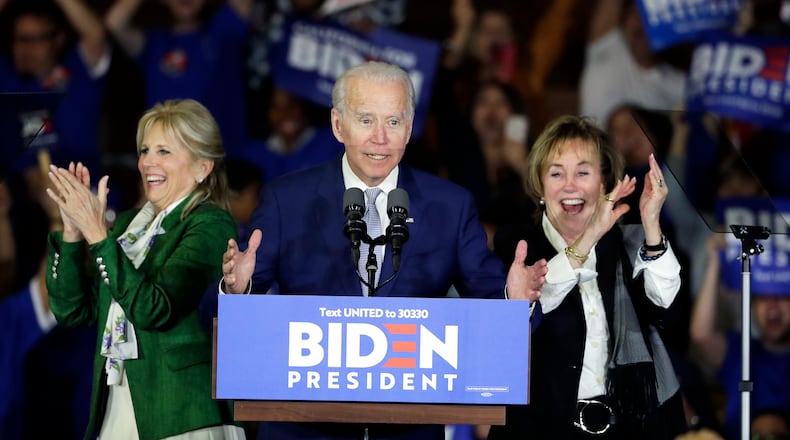Not long ago, Super Tuesday seemed destined to give Bernie Sanders an insurmountable delegate lead. Instead, it became the latest stop on Joe Biden’s comeback tour.
Biden’s epic night sets the stage for an extended head-to-head bout with Sanders that could play out in Georgia’s March 24 primary and beyond before the Democrats pick a nominee to face President Donald Trump.
The former vice president built on his blowout victory in South Carolina by storming across the South. He tallied wins in Alabama, Arkansas, North Carolina, Tennessee and Virginia – racking up victory after victory in states with diverse populations that mirror Georgia’s electorate.
From an afterthought to a juggernaut, he also swept places his cash-strapped campaign largely ignored.
He didn’t campaign in Minnesota but nonetheless carried the state with the help of U.S. Sen. Amy Klobuchar’s endorsement. Nor did he seriously contest Massachusetts – but still dealt a humbling defeat to U.S. Sen. Elizabeth Warren in her home state.
He was outspent by former New York Mayor Mike Bloomberg 100-1 across the political map - and still trounced him in just about every contest.
He soared with the strength of late-breaking voters, as centrists consolidated behind his campaign. That helped him keep pace with Sanders in Texas, where Biden hadn’t spent a cent on TV ads.
It was Biden’s strength in the South, though, where his campaign truly flaunted its muscle. He’d long built his strategy around winning over black voters, the most loyal constituency in Democratic politics. He promised South Carolina would be his “springboard” – and it sprung him to wins across the region.
Exit polls show Biden tallied nearly three-quarters of support among black voters in Alabama and Virginia, and won more than half of African American voters in North Carolina and Tennessee.
“Just a few days ago, the press and the pundits declared this campaign dead. Then came South Carolina and they had something to say about it,” a triumphant Biden declared in Los Angeles. “Then we were told by the time we got to Super Tuesday it may be over. Well, it may be over for the other guy.”
‘Win it big’
It depends on who the other guy is. Warren and Bloomberg were knocked on their heels by the rough night.
But Sanders tallied his own wins. He was set to pick up a trove of delegates in California, the biggest prize of the night, and he won Colorado, Utah and his home state of Vermont.
Surrounded by supporters in Burlington, Sanders took a shot at the former vice president’s more moderate voting record: “You cannot beat Trump with the same old, same old kind of politics,” he said, declaring he would inspire the “highest voter turnout in American political history.”
Bloomberg ended his White House bid on Wednesday, and Warren was under immense pressure to drop out of the race after finishing third in her backyard.
If she abandons the race, Democrats could face a two-way grudge match for delegates between Biden and Sanders that echoes the bruising battle for the nomination in 2016 that didn't effectively end until June of that year.
And when the fight makes a pit stop in Georgia, Sanders could confront the same challenges he did four years ago. Back then, he was steamrolled by Hillary Clinton. This year, he could face a Biden campaign with a strategy to extend its Southern sweep that began next door just a few days ago.
“I was trying to create a surge for Joe Biden. I knew just to win South Carolina was not good enough,” U.S. Rep. Jim Clyburn, whose endorsement helped power Biden’s runaway victory, said on MSNBC.
“He needed to win it big,” the South Carolina congressman said. “And even winning it big wasn’t good enough unless it was done in such a way that the people up in North Carolina and Virginia, and down in Alabama and Tennessee, saw it.”
About the Author
The Latest
Featured



